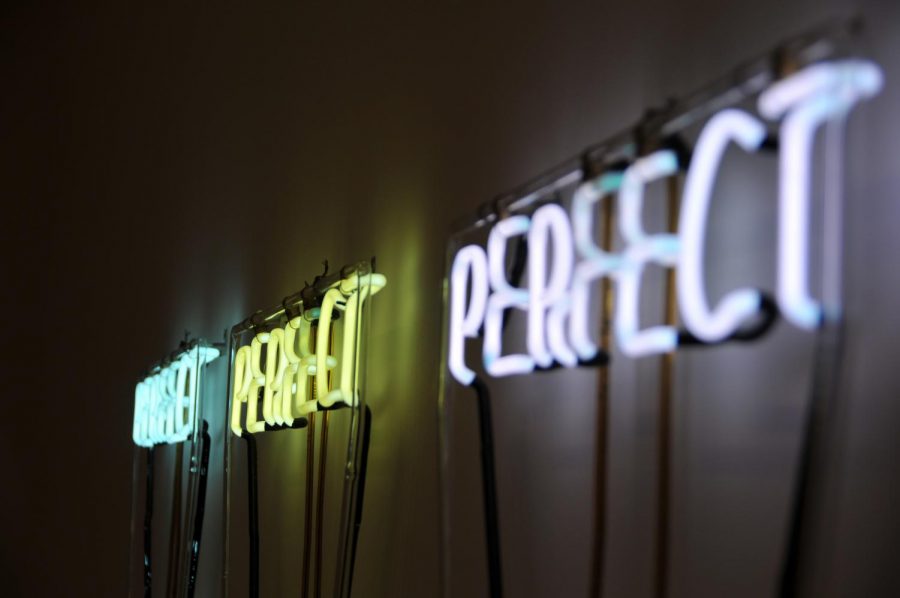Op-Ed: My love-hate relationship with perfectionism
Photo credit: Jonathan Hoxmark from Unsplash.com, licensed for reuse
Three neon signs illuminate the word “Perfect” in colors turquoise, yellow and white in the Museum of Modern Art in New York. My love-hate relationship with perfectionism has taken on a new meaning as I continue to evolve and grow older.
June 3, 2021
My first taste of perfectionism came in the form of the hit reality show “Dance Moms.”
Yes, you read that correctly.
My grandmother and I never missed an episode and always looked forward to eating dinner in front of the television every Tuesday night. I was immediately drawn to the structure and general formatting of the show, starting from the weekly pyramid where infamous dance instructor Abby Lee Miller would rank her students based on their performances from the previous week. One student, in particular, stood head and shoulders above the rest, consistently earning the top spot on the pyramid along with various awards, accolades and opportunities to come.
This student was none other than Maddie Ziegler, the star dancer and featured performer who in my eyes, personified the perfect individual. As a natural-born competitor, it was no surprise that I admired Ziegler for her strong work ethic, determination and fierce desire to win first place in any competition that she participated in — big or small. As early as 8 years old, Ziegler constantly referred to herself as a perfectionist, which was a word that I had never heard of before. But right away, I knew that it was something that I wanted to emulate and later become.
To be quite frank, I wanted to be like Maddie and be absolutely perfect in everything that I did.
Fast forward to the present, as a 16 year old high school student, I’m slightly embarrassed to admit that nothing has changed. Perfectionism rules my everyday life as I find myself striving for perfection in all things that I do, whether it be academic success, athletic achievements or re-organizing my room each day so that it looks “just right.” Oh, and yes, I still watch “Dance Moms” nearly every day, too.
In all seriousness, I am thankful for the successes that being a perfectionist has brought me thus far, including a structured and disciplined lifestyle that allows me to consistently achieve my goals, stay organized and always a step ahead. I am proud of the work that I put into all areas of my life as I truly give 110% of my effort into everything that I set my mind to. Ever since I can remember, my motto in life is “If it were easy, then everyone would be doing it,” to remind myself that the struggle and sacrifice is all worth it in the grand scheme of things.
However, as my successes grew over time, so did my expectations and standards for myself. While initially, this wasn’t a bad thing, a toxic, unhealthy and unrealistic mindset soon developed, prompting me to recognize that perfectionism is that of a double-edged sword.
According to author Stacey Colino of U.S. News & World Report, “Holding yourself to unrealistic or impossible standards can set you up for depression, anxiety, sleep disturbances and other health problems.”
Even though being a perfectionist has enabled me to reach success, it also has constrained my self-confidence and capability to openly accept my mistakes. I tend to overthink minuscule situations and put so much pressure on myself to be “perfect” or to be like Ziegler, that I mentally and physically exhaust myself.
For me, there is no such thing as an “off button” or even an “off day,” as I constantly remind myself that I need to do it better and faster, as my last try will never be good enough for my own standards. Nearly every day I am told by my family, friends, teachers and teammates that I take things too seriously and should learn to just let mistakes or awkward situations go. What they all fail to understand is that I, too, would love to just let my mistakes go by unfazed, but mentally, I have a block that prevents me from just laughing it off like everyone else does.
According to authors Thomas Curran and Andrew P. Hill of Harvard Business Review, “Increasingly, young people hold irrational ideals for themselves, ideals that manifest in unrealistic expectations for academic and professional achievement, how they should look, and what they should own. Young people are seemingly internalizing a pre-eminent contemporary myth that things, including themselves, should be perfect.”
Although I feel overwhelmed a lot of the time, it is comforting to know that I am not alone in my struggle against perfectionism. I’ve learned to give myself a break when needed and to understand that mistakes promote growth, while stubbornness only hinders that process further. I’ve also learned to take off the blinders and focus on what lies ahead as opposed to dwelling on what has already occurred.
In the words of Ziegler herself, “Losing is not a good feeling, but I don’t ever lose anyway.”
And she is absolutely right.
Like her, I refuse to lose this battle against my own perfectionistic tendencies or in simpler terms, against myself.
Onward.










Robert Graham • Jun 25, 2021 at 8:57 pm
I love this article that Nancy sent me… I’ve read it several times because I too am afflicted with perfectionism. When you want everything to be perfect, it leads to anxiety and depression. Try as hard as you can, it’s never perfect. Mine started when my father said, “If a jobs worth doing, it’s worth doing well”. I tell myself that having things organized is better than disarrayed. That leads to constant arranging of everything from objects to thoughts… it’s exhausting. I wish you well with your quest, I’ve been trying for eighty years and haven’t got there yet.
You’re an athlete and should be a perfectionist! Who would want an athlete that said, “Coach, I don’t want to work out anymore, I’m good enough as I am”
Ms. Janssen • Jun 5, 2021 at 10:36 am
Really thoughtful essay, Vaughan — thank you so much for sharing! Lots to reflect on here, and I related to much of it!
Tiffany Smith-Anoa'i • Jun 3, 2021 at 9:48 pm
I admire your vulnerability and truth in this Op-Ed!
Brava VRA!
“Perfect, doesn’t exsist and that’s a good thing!”
Proud of you and your journey…
Ever onward!
Raiza M. • Jun 3, 2021 at 3:34 pm
This article served as my therapy for the day; I relate completely! It’s a blessing and curse that I deal with on a daily basis and I’m turning 35 this year! It’s all about finding the balance…or so they say, LOL! Thank you for sharing, Vaughan…let me know when I can join your perfectionist support group!